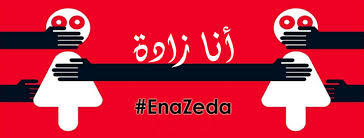Tunisian feminists launched their own #MeToo movement

Last October, a video a 19-year-old Tunisian woman filmed went viral on Facebook. The video depicted a man, who was later identified as Tunisian politician Zouheir Makhlouf, masturbating in front of the girl and her classmate. The video caused widespread national indignation, and even led to legal action being taken against Makhlouf, who has denied the accusation. His wife, Mejda Mouadeb, also defended him by saying that her husband is diabetic and often uses a bottle to urinate in his own car.
While Makhlouf may avoid punishment, as he benefits from impunity as a Tunisian member of Parliament, Tunisian women from different ages and backgrounds still rose up in protest. They began to share their sexual harassment stories on social media under the hashtag #EnaZeda — which means #MeToo in the Tunisian dialect.
Shortly after the hashtag began to gain traction, a small group of Tunisian feminists created a Facebook page through which they began to collect and publish victims’ testimonies, still using the hashtag #EnaZeda. Many women have since sent their testimonies to the group, mostly anonymously for safety reasons.
Kousri Laabidi, one of the page’s admins, told the FBomb that the page aims “to increase the victims’ visibility, mainly, but also to make authorities aware of this movement’s strength and of their indifference towards these women.” She added, “We want to push them to take the necessary measures, and eventually apply the laws on women’s abuse which weren’t applied in most cases. Authorities must stop impunity of the sexual predators’ acts.”
Testimonies published on the #EnaZeda Facebook page include stories of women who have been abused by their teachers, members of their families, or even celebrities. They also include testimonies from male victims and LGBTQ+ people about their sexual assault experiences. The movement also supports and publishes testimonies from women of color who have migrated to Tunisia and, in addition to sexual harassment, experience racism and segregation.
The Facebook page is a safe and inclusive space where everyone can speak about their experiences without fear of facing judgment or violating cultural taboos and form a community. Laabidi expressed her joy about the connections formed via the page between victims who didn’t know each other, yet could feel each other’s pain.
“The different interactions between women from different backgrounds, ages, and cities was just mind-blowing,” she said. “The victims’ courage is undeniable, and the empathy, support given by other women, but also men, is also very heartwarming.”
The movement’s outreach has had real-life effects. For example, one female college student at the Ecole Normale Supérieure school spoke out on the page about a professor who had harassed a number of female students. Other female students at the school were encouraged by her decision, and testified against the professor under the hashtag #le_harceleur_n’enseigne_pas ( #The-harasser-can’t-teach).
Additionally, on November 13, representatives from the #EnaZeda collective protested against sexual harassment in front of the Tunisian Parliament. Makhlouf responded to this protest by reaffirming his innocence and that he “wants justice to act without being influenced by the media outlets or the different organizations.”
Laabidi affirmed that Tunisian feminists are hardly giving up the fight against sexual harassment. “Tunisian feminists have always fought against sexual harassment (notably in public means of transportation), for women’s sexual, reproductive, and bodily rights,” she said, adding that, for her, the #EnaZeda movement “is only the coronation of long years of feminist battles.”
Now, months since the #EnaZeda movement launched, the Facebook page still receives new testimonies each day, and is credited by some with spurring a broader national feminist movement. But there’s still room for growth. As Laabidi said, ”We hope that these testimonies will encourage more women to break the silence and tell their sexual harassment stories.”
More articles by Category: Violence against women
More articles by Tag: Sexual harassment, Rape, Domestic violence, Law, Sexualized violence, Middle East and North Africa, #MeToo



























